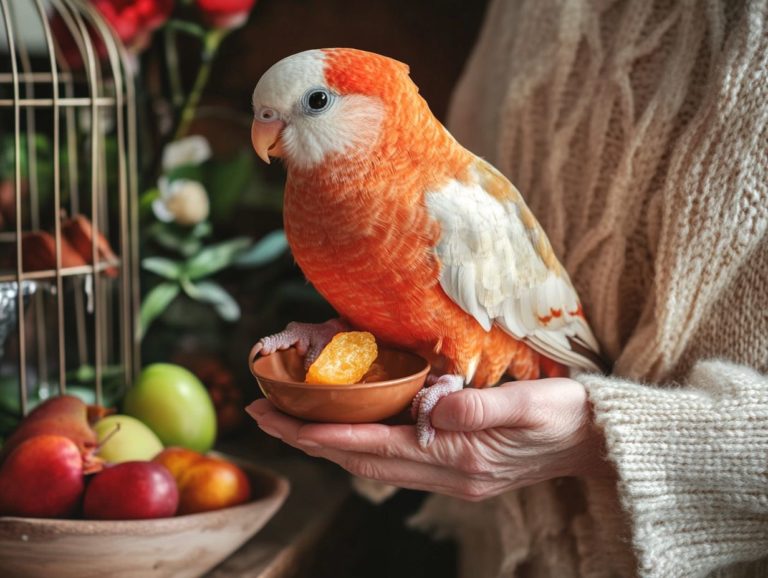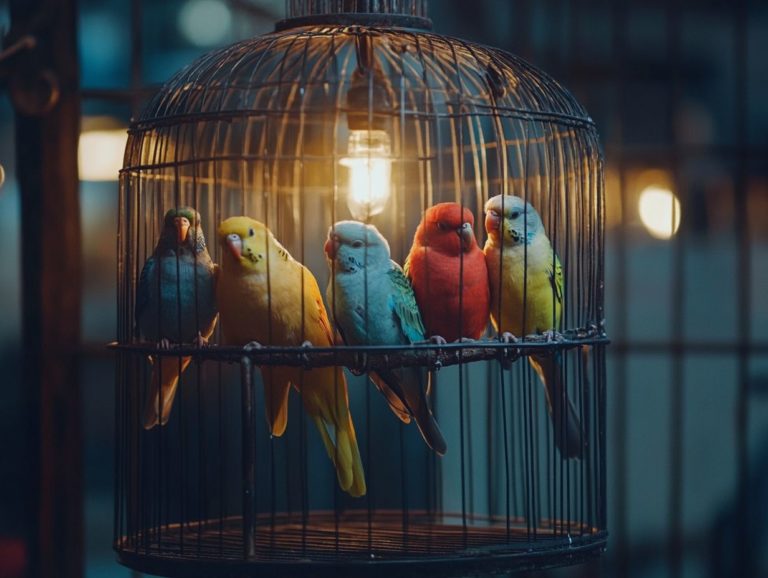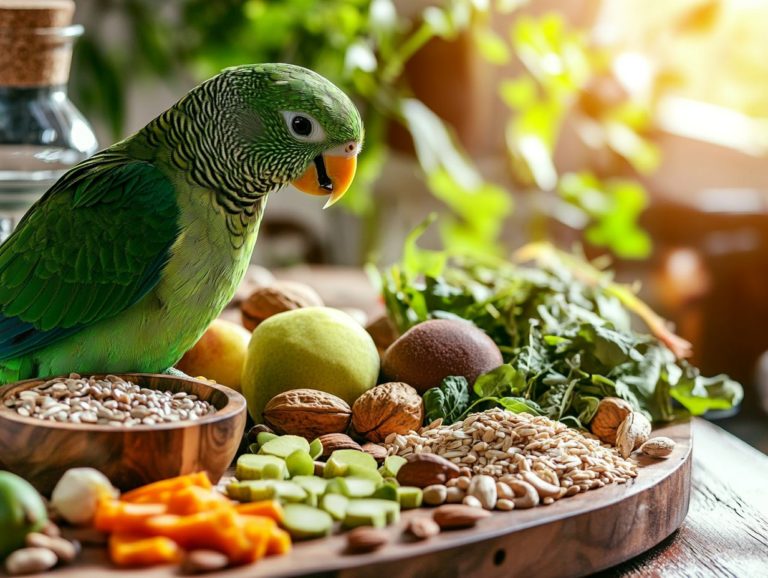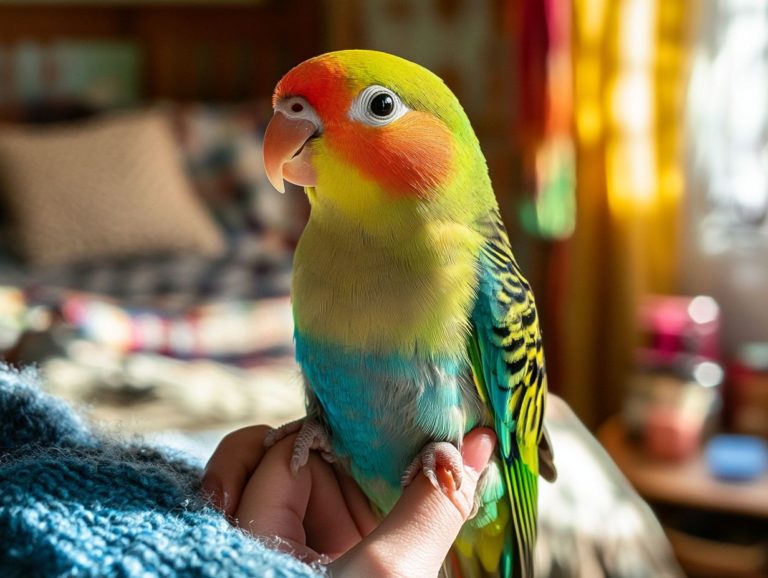How to Choose the Right Pet Bird for You?
Considering a pet bird? The joy of welcoming a feathered friend into your life can truly brighten your days, but selecting the right species of pet birds is about much more than just a charming appearance!
Understanding the different traits and care needs of popular bird species is crucial, as is evaluating your lifestyle and living space. Every decision you make holds significance.
This guide will walk you through everything from budgeting for your new pet to weighing the pros and cons of adopting versus buying pet birds. Let s explore the world of pet birds together!
Prepare your home and heart for a delightful avian companion!
Contents
- Key Takeaways:
- Factors to Consider
- Popular Pet Bird Species
- Assessing Your Lifestyle and Living Space
- Costs and Responsibilities of Owning a Pet Bird
- Adopting or Buying a Pet Bird
- Preparing for Your New Pet Bird
- Frequently Asked Questions
- What factors should I consider when choosing a pet bird?
- How do I know if a particular bird species is a good fit for me?
- Do different bird species have different care requirements?
- What type of budget should I expect when owning a pet bird?
- Is it better to adopt or buy a pet bird?
- Can I handle and interact with different bird species the same way?
Key Takeaways:
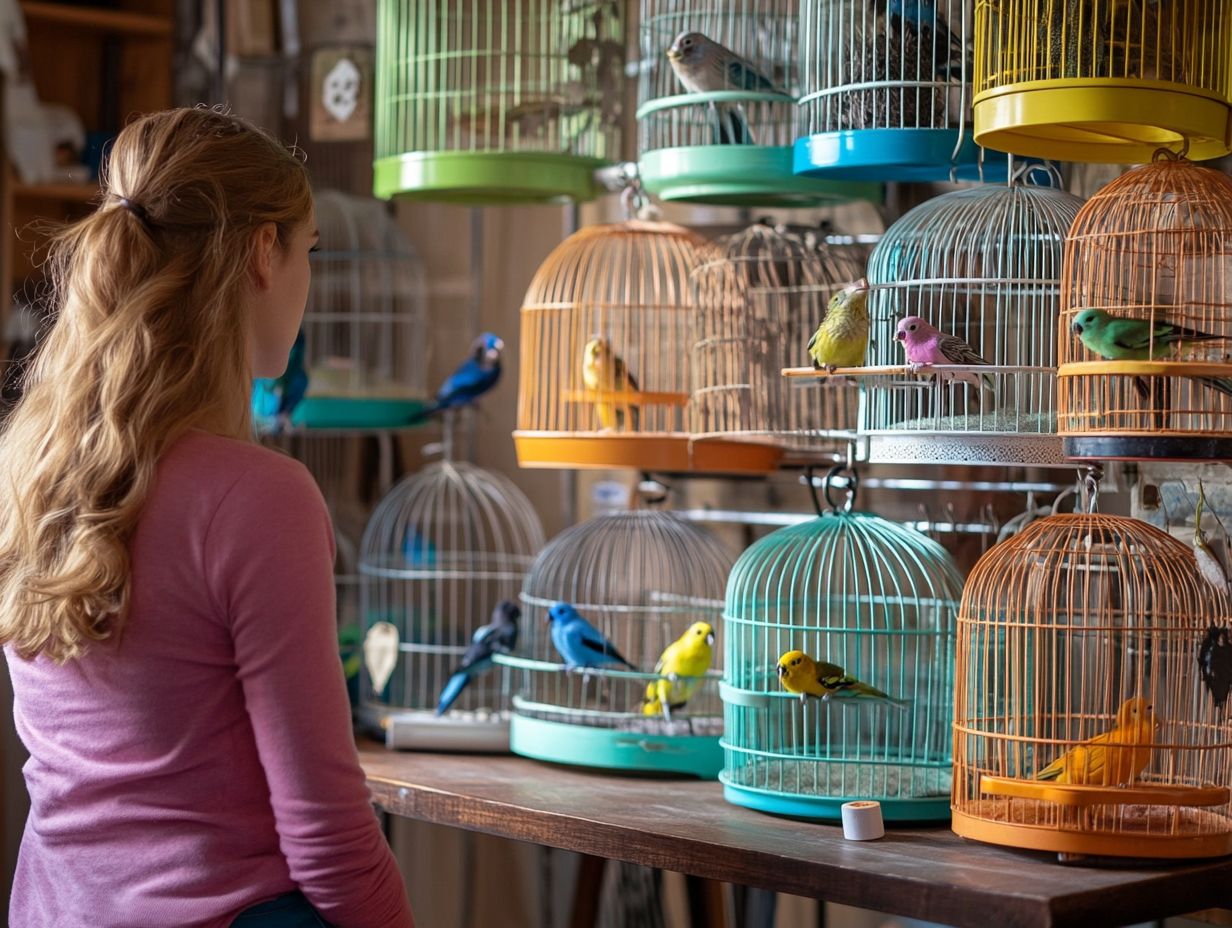
Factors to Consider
Before you choose a pet bird, let’s discuss the important factors to consider. When contemplating the adoption of a pet bird, several crucial factors come into play that can greatly impact both your well-being and that of the bird.
You’ll want to familiarize yourself with the diverse species available, from parakeets and cockatiels to African greys, each with its unique charm and demands.
It s essential to evaluate their emotional needs and social interaction requirements, as affectionate birds thrive on companionship and have unique companionship needs. By taking a holistic view of your living conditions and lifestyle, and by understanding the characteristics and behaviors of different birds, you can pave the way for a harmonious companionship that aligns beautifully with your home environment and expectations.
Popular Pet Bird Species
Among the most sought-after pet bird species are parakeets, cockatiels, African grey parrots, canaries, and lovebirds. Each of these remarkable creatures brings its own unique characteristics and companionship to the table, making them wonderful companion animals.
You might find yourself drawn to these birds for their colorful plumage and vibrant personalities, which truly elevate the experience of bird companionship. By looking into the specific traits of these species, you can make informed choices about your potential feathered friend, ensuring that both you and the bird flourish together in a harmonious relationship.
Characteristics and Care Requirements
Understanding the care needs of pet birds is vital for their happiness and your enjoyment. Each species has unique traits. African greys, for instance, have distinct vocalization patterns, while cockatiels are known for their playful antics. Affectionate birds thrive on social interactions, so creating the right environment can profoundly influence their emotional state and overall health.
Take lovebirds, for example; they form strong pair bonds and require companionship and interactive play to truly flourish. On the other hand, budgerigars are naturally curious, benefiting greatly from engaging toys and stimulating activities.
A balanced diet is essential for your bird’s health. They need a mix of seeds, pellets, fruits, and veggies. Regular health exams, including checks of their beak and feathers, are essential for catching any issues early. This reinforces the importance of establishing a trusting relationship with a qualified veterinarian specialized in birds.
Using positive reinforcement in training not only improves communication but also strengthens the bond between you and your feathered friend!
Assessing Your Lifestyle and Living Space

When adding a pet bird, it’s vital to evaluate your lifestyle and living space. These factors greatly impact your bird’s quality of life.
Consider the size of your home and how much time you can spend interacting with your new friend. Tailoring the bird’s habitat to your lifestyle ensures a happy life for both of you.
Determining the Best Fit for Your Home
Choosing the right bird requires understanding each species’ needs. For first-time bird owners, it’s helpful to consider what are the best breeds based on factors like the bird’s size, vocal behavior, and how much social interaction it requires.
Lovebirds, for example, need lots of attention, while African greys require ample space. Recognizing these needs helps create a comfortable home.
Understanding these characteristics allows you to foster a harmonious living environment. Smaller species like budgerigars are great for apartments due to their size and quieter nature. If you can invest time with a social parrot, you’ll gain a wonderful new friend.
Implementing proper care routines is essential. Enrich their environment with toys and use effective training methods to strengthen your bond. Regardless of your lifestyle, assessing these traits will lead you to the perfect winged addition.
Costs and Responsibilities of Owning a Pet Bird
Owning a pet bird means considering costs and responsibilities. You must plan for initial expenses and ongoing care.
From buying a bird to ensuring it has proper housing, food, and healthcare, be ready for a financial commitment. Your time is equally important for interaction and training.
Budgeting and Time Commitments
Effective budgeting and time management are key to happy bird ownership. You ll need to plan for initial setup costs and ongoing expenses like food and healthcare.
Create a financial plan that details all expected costs, including food specific to your bird. Investing in quality toys for mental stimulation is crucial.
Designate specific times each day for bonding and play. This not only fosters a harmonious household but also meets your bird s social needs. Additionally, reminders for feeding and cleaning routines help maintain balance in your life.
Adopting or Buying a Pet Bird
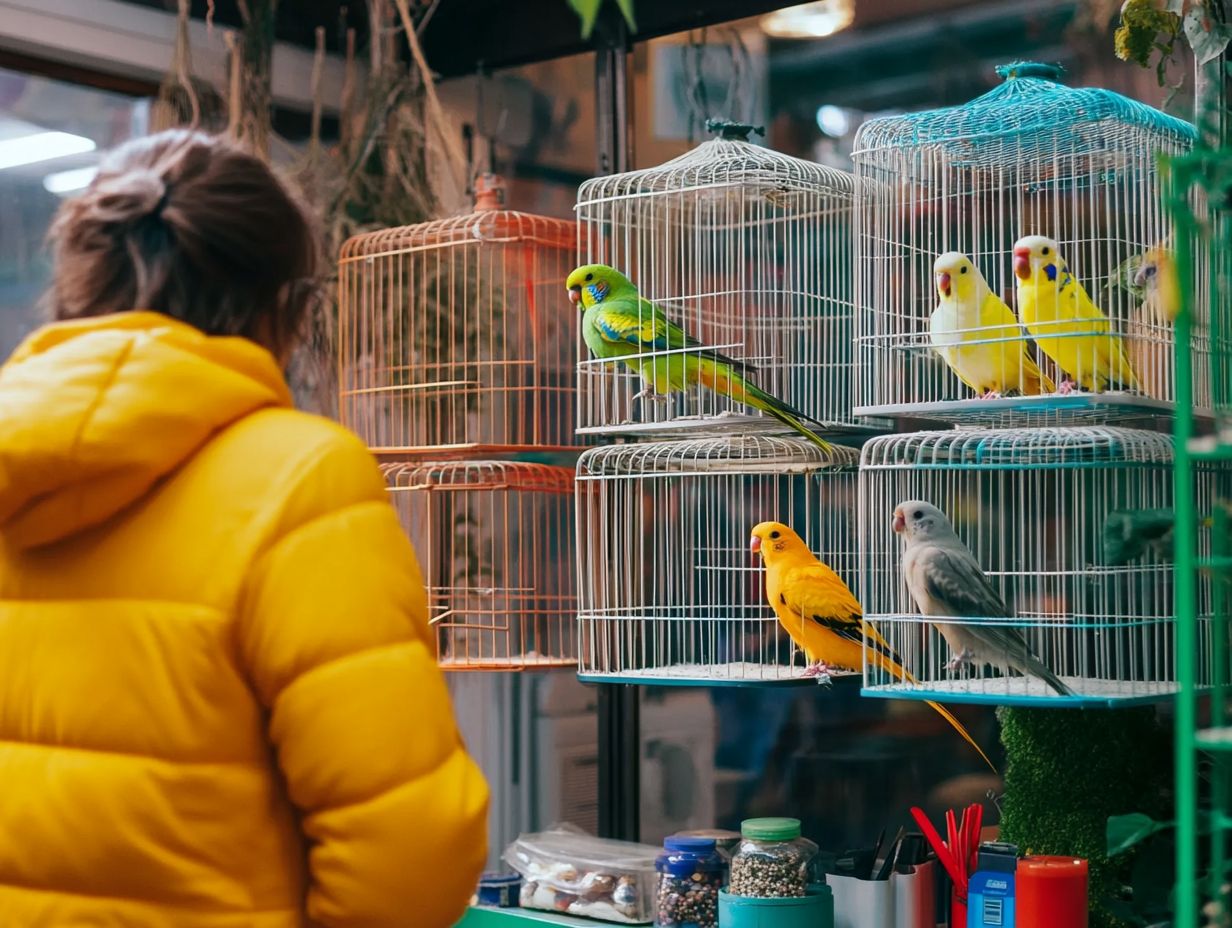
When thinking about getting a pet bird, you can choose between adopting and purchasing from well-known breeders. Each path has its own unique advantages and challenges.
Adopting a bird not only supports animal welfare but also gives a loving home to a creature in need, especially given the long lifespan of various bird species. On the other hand, buying from breeders allows you to select specific species or traits that align with your preferences.
Understanding these options is essential for making a thoughtful decision that resonates with your values and complements your lifestyle.
Pros and Cons of Each Option
When considering whether to adopt birds or purchase from well-known breeders, you must weigh the pros and cons carefully. Adopting is often more budget-friendly and provides a second chance for a bird in need, though it may come with unknown health histories.
Buying from breeders lets you choose specific species and typically comes with assurances that the bird is in good health, but it can be pricier.
As you contemplate these options, it’s crucial to think about your new bird’s emotional needs. Statistics reveal that around 50% of pet birds are rehomed within their first year, often due to a lack of understanding of their needs. This underscores the importance of proper preparation, whether you choose to adopt or purchase.
Personal anecdotes frequently illustrate how adopters find immense fulfillment in providing a loving home to a bird that has faced neglect. However, some people prefer the predictability of acquiring a bird from a breeder, who usually offers detailed lineage and health information, providing a clearer picture of what to expect in terms of temperament and care requirements.
Preparing for Your New Pet Bird
Preparing for your new pet bird means thoughtfully gathering essential supplies and understanding the necessary precautions to ensure a seamless transition into your home.
You’ll need:
- a suitable cage for your bird’s species.
- Engaging toys to keep your bird entertained.
- Nutritious food that meets your bird’s dietary needs, such as options for canaries and lovebirds.
Establishing a routine for training methods and social interaction is just as vital, as it can profoundly influence their emotional well-being and overall welfare.
Essential Supplies and Precautions
The essential supplies for your new pet bird include a suitable cage, engaging toys, and high-quality bird food to ensure their well-being and happiness. The cage should provide ample space for movement and create a safe environment that fosters healthy bird behavior.
Toys not only entertain but also stimulate their minds, while proper nutrition is crucial for their health. These elements are vital as you prepare to welcome your feathered friend.
A spacious, well-constructed cage serves as the cornerstone of your bird’s habitat, minimizing stress and encouraging natural behaviors like flying and perching.
Along with the physical space, incorporating a variety of toys think swings, puzzles, and foraging items can significantly enrich their daily experiences. Interactive toys that challenge problem-solving skills promote play and stimulate their intelligence, nurturing a healthy emotional state.
Choosing the right diet guarantees that your bird receives the essential nutrients needed to thrive, directly impacting its energy levels and overall mood. This attention to care enhances the bond between you and your feathered companion, fostering a lasting bird companionship.
Frequently Asked Questions
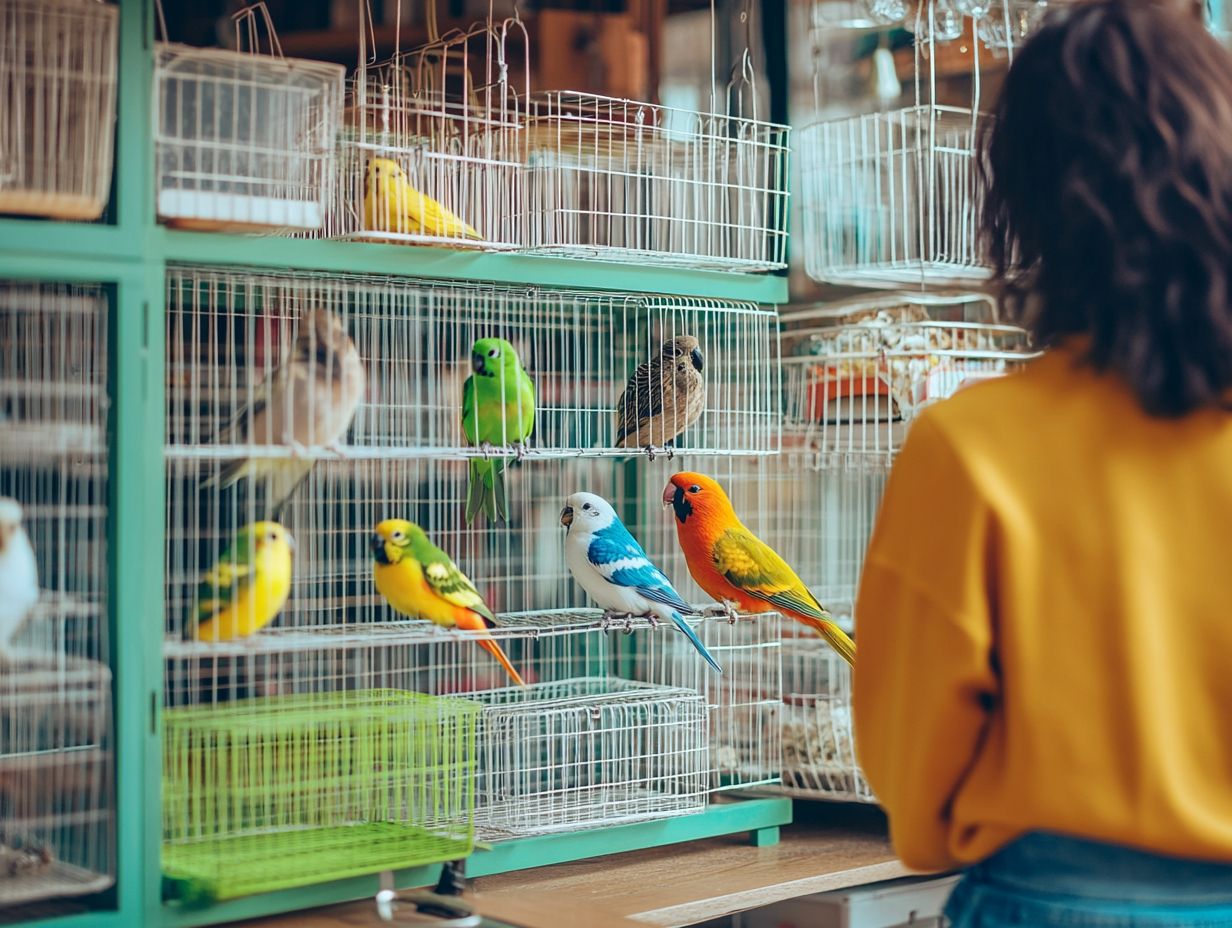
Having a pet bird brings immense joy and companionship. Remember to research thoroughly, be prepared, and ensure responsible ownership. Your feathered friend will bring you endless love and happiness!
What factors should I consider when choosing a pet bird?
When choosing a pet bird, consider your lifestyle, living situation, budget, and commitment level. Shopping for birds lets you see their colorful feathers and unique personalities.
How do I know if a particular bird species is a good fit for me?
Understanding a bird’s lifespan and healthcare needs is crucial. Research the traits of different species to find a suitable match.
Talking to experienced bird owners or visiting a bird store can provide valuable insights.
Do different bird species have different care requirements?
Yes, different species have unique needs for diet, exercise, and socialization. Research these requirements to find the right bird for you.
What type of budget should I expect when owning a pet bird?
Expect costs for food, toys, cages, and veterinary care. The budget will vary based on the bird type and its specific needs.
Is it better to adopt or buy a pet bird?
Both options have their pros and cons. Adopting gives a bird in need a loving home, while buying allows you to choose its upbringing.
Your choice will depend on what feels right for you!
Can I handle and interact with different bird species the same way?
No, each species has its temperament and handling needs. It s essential to learn how to properly interact with your specific bird.

